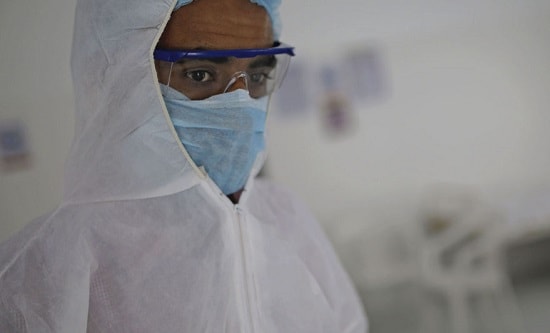
Few countries are worse equipped than Yemen to deal with the coronavirus pandemic. Through the last five years the country has been laid to waste, divided and shattered in a war led by Saudi Arabia against the Ansar Allah (Houthi) coalition. The health service has been destroyed, food production has been disrupted and 80% of the population rely on humanitarian aid. The coronavirus pandemic comes on top of an ongoing cholera outbreak and flash floods across the country in April. Aid funding is drying up and this will continue as states endure virus-induced economic crises and concentrate their resources domestically. All the while Britain and the US continue to back the brutal Saudi state in its criminal war. TOBY HARBERTSON reports.
Yemen was among the last countries to officially record a case of Covid-19, declaring its first confirmed infection on 10 April. The first case in the area controlled by the Houthi-led resistance movement was not declared until 5 May in the historic capital, Sanaa. However, the UN believes that the virus has been spreading throughout the country for much longer, with Yemen’s health service lacking in capacity to diagnose and track the infection. Other viruses with some similar symptoms, including dengue fever, the chikungunya virus and malaria, are rife in many areas. 110,000 cases of cholera have been reported since the rainy season began in April, and many more look set to follow.
Saudi Arabia declared a ceasefire on 9 April as the threat of the virus became clear. Houthi movement spokesman Mohamed Abdel-Salam called this a ‘political and media manoeuvre’ and did not formally accept the ceasefire. Some fighting has continued. On 25 April the Southern Transitional Council (STC), a separatist movement backed by the United Arab Emirates (UAE), declared self-rule over the important port city of Aden and its surrounding provinces, exacerbating divisions in Yemen. Aden is the interim seat of Yemen’s Saudi-backed government and has become a hotspot for Covid-19 infections.
More than half of Yemen’s hospitals and clinics have been destroyed or closed due to the war, with the majority of them hit by Saudi coalition airstrikes. International bodies including the UN, Amnesty International and Medecins Sans Frontieres have accused the coalition of intentionally targeting health facilities. These airstrikes have paved the way for a devastating pandemic. Coming on top of other disease epidemics, and a population weakened by famine and violence, the coronavirus could have a cataclysmic effect. The World Health Organization (WHO) warns that up to 93% of the population could become infected (Guardian 13 May). There is already a drastic shortage of intensive care units and other medical facilities and international aid to the health care system looks certain to be cut.
Existing aid shortfalls are becoming drastically worse. Prior to the pandemic, there was already a massive shortfall in international aid, with funding targets set by the UN and WHO not having been met, and some countries already failing to pay their promised contributions. The pandemic has made this situation even worse. The WHO says it now faces a $150 million shortfall in Yemen and will have to cut support for supplies for health centres, trauma care, and the treatment of conditions like cancer. WHO payments to support the salaries of health care workers in Yemen are already being phased out (The New Humanitarian 7 May). The US cut its payments via USAID for Yemen in March, blaming Houthi mismanagement, leading to the UN cutting 31 out of 41 aid programmes (Middle East Eye 28 April). The UN World Food Programme, which feeds 10 million Yemenis, has had to halve food deliveries. The UNHCR has warned of an $89.4m funding gap for its activities in Yemen, where there are 3.5 million refugees and internally displaced people.
Perversely, the Saudi state is the main funder of humanitarian aid in Yemen, in order to assuage the world’s worst humanitarian crisis which it has created. Saudi Arabia is hosting a UN fundraising conference on 2 June to try and stave off the complete collapse of its southern neighbour. During the five years of Saudi-led onslaught on Yemen, British arms company BAE Systems has sold more than £15bn worth of arms to Saudi Arabia, with £2.5bn sold in 2019. Saudi Arabia, and its imperialist backers in Britain, the US and elsewhere, cannot be part of the solution to Yemen’s humanitarian crisis. They are the problem.




